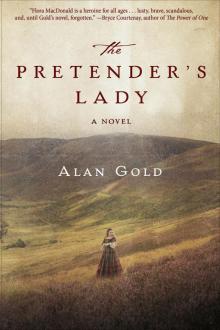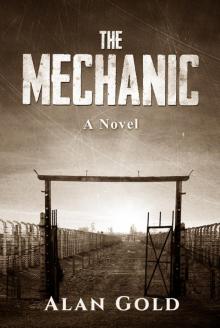Bell of the Desert Read online
Copyright © 2014 by Alan Gold
All rights reserved. No part of this book may be reproduced in any manner without the express written consent of the publisher, except in the case of brief excerpts in critical reviews or articles. All inquiries should be addressed to Yucca Publishing, 307 West 36th Street, 11th Floor, New York, NY 10018.
Yucca Publishing books may be purchased in bulk at special discounts for sales promotion, corporate gifts, fund-raising, or educational purposes. Special editions can also be created to specifications. For details, contact the Special Sales Department, Yucca Publishing, 307 West 36th Street, 11th Floor, New York, NY 10018 or [email protected].
Yucca Publishing® is an imprint of Skyhorse Publishing, Inc.®, a Delaware corporation.
Visit our website at www.yuccapub.com.
10 9 8 7 6 5 4 3 2 1
Library of Congress Cataloging-in-Publication Data is available on file.
Cover design by Yucca Publishing
Print ISBN: 978-1-63158-007-9
Ebook ISBN: 978-1-63158-023-9
Printed in the United States of America
This book is dedicated to all of the astonishing, outstanding, and brilliant women of the past who have been dismissed, discounted and obliterated from the annals of history, simply because men were in charge of keeping the records.
ONE
Baghdad, April, 2003
In the beginning, there was shock and awe. The American president promised the world the greatest fireworks display in human history, a minimum number of civilian casualties, and a brief but merciless engagement with the Iraqi Republican Guard. The mission was to eliminate weapons of mass destruction and to replace a genocidal dictator and his sadistic sons with a democratically elected Iraqi government of the people, for the people and by the people.
In the beginning, it all went well. American troops met no resistance from Saddam’s vaunted army of a million men. Pilots of B52 bombers flew unopposed through the air over Iraqi towns and villages, dropping laser-guided bombs onto garish palaces and government buildings, destroying in seconds the hubris of a dictator whose monuments for decades had symbolised his people’s suffering. Tomahawk and Cruise missiles, F-14 Tomcats and F/A-18 Hornets screamed over a terrified populace and skimmed above rivers and deserts, steel birds of prey in Iraq’s ancient skies.
And when the air was again silent, clean, and breathless, dozens of 70-ton Abrams tanks began rolling towards Baghdad, shaking the dust of eons from ancestral monuments. Iraq’s million-man army disappeared like a desert sandstorm in the time it took to change TV channels. A world watched in amazement as huge tanks, once engines of warfare, became elephants pulling down ostentatious statues of the great dictator. The Colossus of Baghdad was no more.
In the beginning, the Iraqi people welcomed the Americans. They danced in the streets on top of portraits of Saddam which had once adorned the entire sides of buildings. They tore at them with their fingernails and defaced and mutilated them until satisfied that they had humiliated the man hated and feared by so many. They jumped on top of his images and spat at his statues. They hit them with mallets and hammers, and shot at them with rifles and machine guns. They searched everywhere for him and his insane sons so they could vent their wrath.
And then, where earlier there had been the fury of war, silence descended as news began to circulate that Saddam and the entire command structure of repression and evil had disappeared from their command bunkers, and now there was nobody in control of Iraq. Like so much of the nation’s ancient history, Saddam had buried himself underground, and it would take foreigners to dig him up again.
Singing and dancing and kissing soon gave way to irrepressible greed as the looting began. Shops, factories, warehouses were denuded by a people suddenly released from the chains of tyranny, no longer petrified of Saddam’s secret police, his army and his torture chambers.
A huge building dedicated to the country’s past was emptied with an almost maniacal sense of mischief. It was the National Museum of Iraq. This museum, which housed some of the world’s finest collections of antiquities, some dating back five thousand and more years, operated in conjunction with the British Museum even during the most oppressive days of Saddam.
First Lieutenant Michael Jennings Rourke led his twenty man scouting patrol along the western banks of the Tigris River, near to the course of the Old City Wall, following tanks which were clearing the way and ensuring no machine gun nests would pose a problem for his troops.
Before him loomed the walls of the compound which housed the Iraqi National Museum. From a distance, they looked like animals scurrying around in a nest, but as he led his patrol closer, Lt. Rourke could see that men and boys were swarming throughout the compound, running away with priceless vases and statues and pottery and idols and other objects of inestimable value. He shot an M16 round into the air to scare them off. By the time he and his men entered the broken building, it was already empty both of the Baghdadi looters and of their country’s most prized possessions, precious objects from the dawning of mankind’s earliest civilization in Mesopotamia, the Land between the Rivers Tigris and Euphrates.
Lt. Rourke gave terse orders for his men to search the building, warning them of the dangers of snipers who might be hiding in the upper balconies and levels of the building.
There was dust and shards of glass everywhere, both from the initial collateral damage caused by the American bombardment in the earliest days of the battle for Baghdad, and from the looting which had followed when the Iraqis determined that they wanted to benefit from the war. But every display case, every article, every idol and statue and stele and frieze which had once made this one of the greatest monuments to mankind’s earliest genius, had been taken. Nothing was left other than dust and destruction. He shook his head in disgust. Having majored in History from Syracuse University, he had a fair idea of what should have been here, a collection gathered together over a hundred years by archaeologists from around the world who had come to the cradle of civilization to uncover the record of the people who had first taught humankind how to write, to record, and to narrate myths in explanation of the natural phenomena which governed their lives.
He heard his name called. Turning, he saw one of his younger troopers, a nervy black kid from Harlem, not more than seventeen years old. Dwayne or Duanne or something.
“What is it?” he called.
“Over here, sir. Dey lef’ sumpin’.”
Michael Rourke walked over, his army boots crunching over the glass and splintered wood. He joined the young trooper, and together they looked at a marble bust of a severe-looking woman, hair tied back in a tight bun. From the neckline of her dress it was obvious she was no ancient, but from a much more recent age. Probably Victorian or from early in the twentieth century.
“Only one dey left. Muthafucka cain’t be no value? Y’all know what it is?” asked the trooper.
Michael shook his head. He had no idea why it was the only object left behind. He cleaned the inscription with his fingers, blowing away the dust which obscured the carved dedication. It was both in Arabic, and in English. It said,
Gertrude Bell. A Woman of Iraq.
First Director of the National Museum.
Presented by a grateful King and People.
“Who dis lady?” asked the trooper.
Michael looked carefully at the middle-aged woman. He’d never heard of her. And neither did he have time to wonder. The building had to be secured before he and his men could move on.
He turned to the young trooper. “No idea,” he said, and moved deeper into the building.
When all this was over, he thought, he might Google Gertrude Bell and try to find out something about her. She might
be interesting . . .
~
Windsor Castle, October 1888
The young woman standing in line before Gertrude was nervously arranging and re-arranging the curls in her hair which cascaded beyond her neck and over the bodice of her flawless white ball gown. Her gleaming black hair partially hid the pearls embedded within the delicate Irish silk embroidery and organza lace which suffused the dress’s neckline. The girl’s father, the plump and pompous Duke of Rawlthone, whose orotund voice was strangely muted for the occasion, stood beside his daughter, whispering in her ear to stop fidgeting. Immediately obeying her father’s instruction, the young woman moved in procession with the long line of precisely-arranged debutants as they stepped a single pace forward to advance towards the Throne Room for each successive candidate to curtsey before Queen Victoria.
Hugh, Gertrude’s father, glanced at his daughter. Unlike the other debutantes who could barely contain their fear at approaching Victoria, Gertrude was calmly looking around the room, taking in its vaulted architecture, the Gainsborough, van Dyke and Reynolds masterpieces hung on the walls, and the resplendence of the princes and princesses, the dukes and duchesses and the marqueses and marchionesses clustered in the vast auditorium watching the latest contingent of eligible young women from noble families about to be released onto the marriage market.
Hugh never ceased to be amazed by his marvellous daughter’s ability to take command of whatever situation in which she found herself. Since her earliest days, she’d always seemed more adult than child. She was both sister and mother to her younger brother Maurice. After Hugh’s marriage since the death of his beloved Mary, Gertrude had willingly accepted Florence as her stepmother, and had done her very best to be a glorious daughter.
When she went up to Oxford as one of the University’s first women students, she’d refused to be cowed by the young men’s chauvinism and bullying or the disdain she’d experienced from the dusty old professors. Indeed, she’d taken a first in history in only two years, some sort of University record, he was told. And now, just as she was about to come out in her presentation to Victoria, Queen of England, its Colonies and her Empire, Gertrude just stood there, tall and regal, auburn hair aflame, yet cool as a cucumber, as though she was about to be introduced to the new parish vicar. Amazing!
“Aren’t you in the least daunted?” he whispered.
“Daunted? Why?” Gertrude asked quietly.
“You’re about to meet the Queen of England,” he said.
She didn’t reply, but only looked at him oddly and frowned. “You seem more nervous than me.”
Her father shook his head. “Too much Oxford, m’girl. That’s your trouble.”
Gertrude looked round at her father, and frowned. “Frankly, these other girls need a bit of Oxford to stiffen up their spines.”
Before her father could respond, the equerry’s stentorian voice called out, “Your Royal Highness, may I introduce in attendance His Grace the Duke of Rawlthone, who approaches your throne to present to you his daughter, the Honourable Eugenia.”
Gertrude watched as the pompous man grasped his daughter’s arm and almost pulled her forward, her jellied legs struggling on the long walk from the corridor, passed the hundreds of assembled nobility in their brilliant gowns and jackets. Gertrude watched as they approached the foot of the throne and the young Eugenia perform a perfect curtsey, genuflecting to the Queen while her father the duke bowed low from the waist. Only when Victoria nodded, smiled and raised her left hand a fraction, did the father straighten up and was the daughter permitted to rise. Then, wordlessly, and by the merest dismissive flick of the equerry’s finger, their time before royalty was up, and they walked uncertainly backwards towards the assembled throng of nobility, never once committing the ultimate social gaffe of turning their backs to the queen.
~
The Queen’s equerry glanced at the father and daughter now at the head of the queue and waiting at the end of the corridor for admission. He looked at his list and appeared to sneer when he realized the next candidate to present his daughter for coming out wasn’t a prince or a duke or even a lord, but a mere honourable, some industrialist from up north of the country.
Emphasising Hugh’s lack of title to ensure the man’s debasement in front of the nobles gathered before their monarch, the equerry said, “Your Royal Highness, may I introduce in attendance the Honourable Hugh Lowthian Bell who approaches your throne to present to you his daughter Gertrude.”
Gertrude walked towards the throne, one pace ahead of her father. Having been well tutored all day by a succession of Ladies in Waiting, Gertrude curtseyed low to the ground as her father bowed in deference to Victoria. While close to the polished oak floor, she sneaked a look up at Victoria’s dress. It was the customary pitch black silk worn because she was still in mourning for her beloved Albert who’d died twenty-seven years earlier, but there were pearls sewn into the hem, which indicated Victoria was now accepting some adornment, some relief from the burden of her grief.
Sneaking a further look upwards, against the strict instructions of the Ladies in Waiting, Gertrude saw that Victoria was whispering to her equerry, who was furiously searching his notes in order to answer the queen’s question. But he shook his head and whispered something back, then he bowed low and retreated.
Her voice was deep and gravelly, but instantly silenced the muffled chatter in the audience hall because the queen rarely spoke during these coming out occasions, and only then to the daughter of a duke or above personally known to her. Sensing that something sensational was about to happen, the assembled nobility listened with mounting expectation.
“You’re the gal who’s just been at the University in Oxford, aren’t you?” asked Victoria.
Gertrude stood immediately to respond to the queen. There was a gasp at the unprecedented impertinence of her action, throwing centuries of protocol out of the window. Nobody, but nobody, and especially not a young girl coming out, ever stood before the queen had said “rise,” and never engaged in conversation as though she were a familiar.
“Yes, Your Royal Highness. I took a degree in history. One of the few degrees open to women.”
“And what was it like? You were one of the first girls there, I’m told.”
“It was very enjoyable, thank you, Your Majesty. And very challenging.”
“And what bit of history did you study?”
Gertrude smiled. “Actually, Majesty, I studied your family’s history from the time your ancestors were in Hanover to your late uncle William.”
Victoria nodded and masked her smile. The hordes of nobility in the room could barely believe their ears, especially when Victoria continued the conversation. “Ah, yes, the four kings George. And what aspect of their lives did you find particularly interesting?”
“Well, they were participants in a most fascinating time of Britain’s history, but what I found really absorbing were the relationships between the monarch and the next in line to the throne. I could never properly understand why there was such intractable hatred between father and son. Such unhappy relationships. It’s not particularly unusual for there to be jealousy between monarch and the successor, after all, British history is full of it, but your recent ancestors . . .”
She felt a sharp pinch in the shoulder as Hugh tried to stop his daughter from talking. But contrary to what the entire shocked audience was thinking, the queen smiled and said, “We’ll have to forego this discussion, my dear, for I have a lot of young women to welcome. And you’re not quite right about all my predecessors. I was very close to my dear late uncle, King William. Perhaps, Miss Bell, we might meet after the formalities, and share a cup of tea, and you can tell me more of what you learned about my ancestors.”
Hugh bowed, Gertrude curtsied again, and they walked backwards into the assembly of nobility. When they were absorbed and cordoned off from the throne by the crowd, Gertrude turned to her father, and said quietly, “Well, that seemed to go quite well, d
idn’t it.”
Ashen-faced, her father hissed, “I . . . how could . . . you mustn’t . . . you can’t be that familiar with the queen. After all, she’s the queen . . .”
Gertrude frowned and asked, “Father, I wasn’t being familiar; Her majesty was engaging me in conversation.”
“She was being nothing more than polite.”
“And I was being polite. And she’s not quite correct. You see, whilst the queen was certainly close to her uncle, William hated Victoria’s mother, the Princess of Saxe-Coburg, and if the stories are true, banished her from his palace and it’s said that he used to constantly berate her whenever they were in public for the way she kept Victoria from him. Victoria’s mother wanted to rule after his death as co-regent with her lover. What’s fascinating is that the Hanoverian disease of parent-hating offspring seems to be continuing to this day. It’s said that Victoria detests her son, the Prince of Wales, and blames him for the death of Albert.”
Horrified that she might be overheard, Hugh said, “Silence, child! This isn’t the right place, nor is it one of your university tutorials. I’m your father, not—”
“But it’s true and all the gossip in London, which is why the prince to this day has so little to do with the palace. Apparently when Edward was a young man, he behaved appallingly and Prince Albert was forced to ride on horseback, all through the night and in the middle of winter in order to rescue him from some scandal which could have damaged the crown. As a result, he caught a cold and died of typhoid. Victoria has never forgiven Edward. But I don’t think I should raise that topic when I have tea with the queen. It might upset her.”
“Gertrude,” whispered Hugh, increasingly irritated by his daughter’s unrestrained enthusiasm. “You may be factually correct, but you’re being socially inept. There’s a time and a place and this is neither. You’ve just come out. This is a ball. The queen traditionally disappears before the music begins. She’s not going to sit down with you and have a chat. It was just a passing remark. And God only knows what you’ve managed to do to the family’s reputation by addressing the queen directly in such a moralising way, especially when you were specifically ordered by the Ladies in Waiting just to say ‘yes Ma’am’ and ‘no Ma’am’ on the flimsiest chance that Her Majesty might deign to speak to you.”

 Birthright
Birthright The Pretender's Lady
The Pretender's Lady The Mechanic
The Mechanic Bloodline
Bloodline Bell of the Desert
Bell of the Desert Bat out of Hell
Bat out of Hell Stateless
Stateless